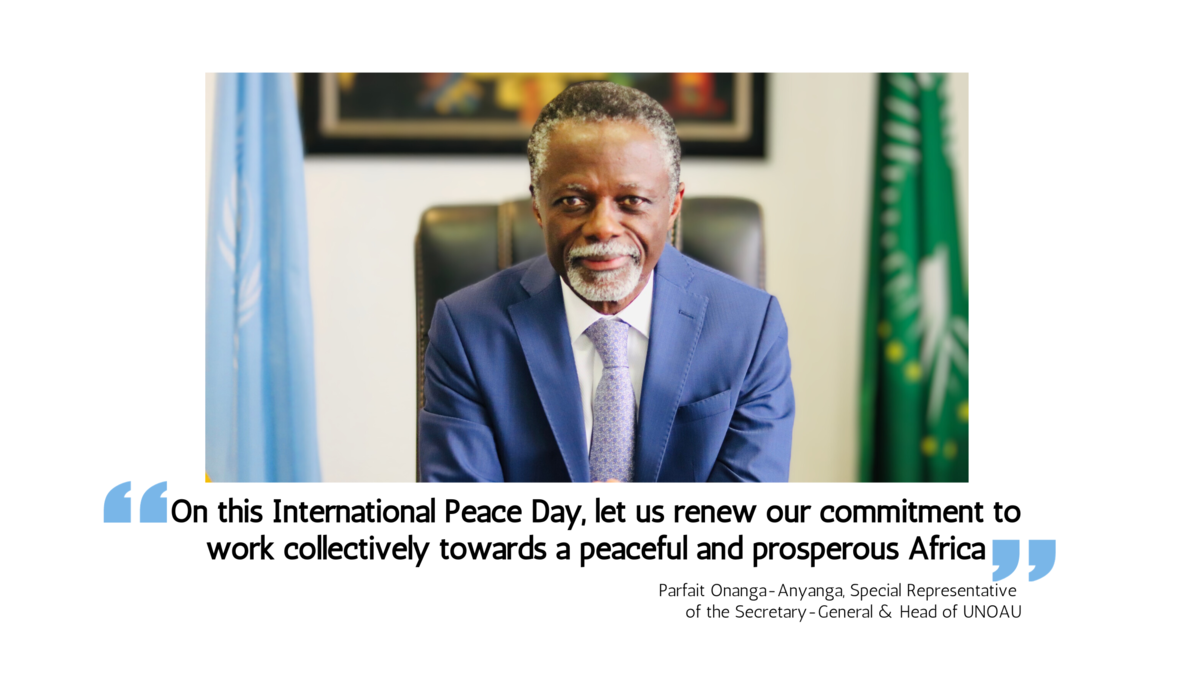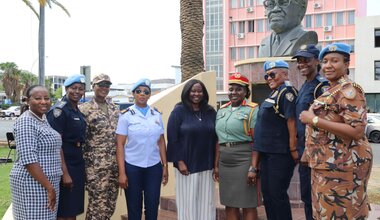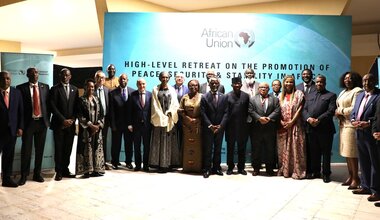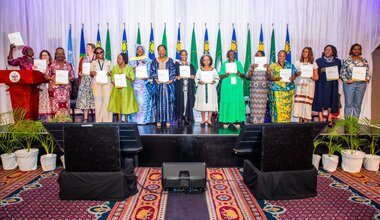Peace Day 2023 | Reflection by SRSG Parfait | The Nexus of Peace and Development: Steering Africa Towards a Prosperous Future
As we commemorate International Peace Day, it is imperative to reflect on the words of the UN Secretary-General Antonio Guterres, who remarked, "There is no peace without development and no development without peace; it is also true that there is no peace and sustainable development without respect for human rights."
This year's theme for Peace Day is "Actions for Peace: Our Ambition for the Global Goals", a call to action recognising our individual and collective responsibility to foster peace. The call resonates with the African continent, which stands at a pivotal juncture in its journey towards sustainable development. The nexus between peace and development is not just a concept but a tangible pathway that can unleash Africa's fullest potential for a future marked by lasting peace, shared prosperity, and equal rights for all.
To date, despite the remarkable work that has been undertaken across the globe to achieve the Sustainable Development Goals (SDGs), there have been significant setbacks resulting from several factors, notably the devastating effects of climate change, rising insecurity, including terrorism and violent extremism, and the debilitating social-economic impact of the COVID-19 pandemic. Much remains to be done, particularly in Africa, and we must ask ourselves what it will take to attain the SDGs and fully align Agenda 2030 with the implementation of Agenda 2063 in furtherance of the 'Africa We Want'? Data outlined in the recent 2023 SDGs/Global Goals report is a stark reminder of the need to work collectively to meet our ambitious targets with greater urgency and focus. According to the report, we have barely achieved 15% of our commitments under the SDGs. 48% of the implementation is either moderately or severely off track, while 37% of the goals are stagnating or regressing.
A complexity of setbacks ranging from the lack of equitable access to education, resources, and conducive living standards– among others – has stifled progress. Poor governance and conflict have had a devastating impact on economic and educational infrastructure, hampered growth, and impeded children's ability to go to school. For instance, according to UNICEF, over a million children have been forced out of their homes and need basic humanitarian assistance since the ongoing conflict started in the Sudan – "a million children"! Poverty continues undermining steady economic and human development in Africa, with 33 of the 46 Least Developed Countries (LCDs) being African. However, in its twenty-third volume on the Indicators for Gender, Poverty, the Environment and Progress in SDGs implementation in African Countries, the African Development Bank stipulated that the proportion of employed adults aged 25 years and above yet living below the international poverty line was 26.0 per cent in 2019, having dropped from 32.3 per cent in 2010.
On women's empowerment (Goal 5), the same report shows that the percentage of seats held by women in national parliaments grew to 24.8 per cent in 2021 from 23.2 per cent in 2016 and 15.7 per cent in 2010. While there is some progress compared to 2010, I am concerned by the slowing progress in women's representation between 2016 and 2021. This calls to question the implementation of National Action Plans and policies supporting the UN Security Council Resolution 1325 on the Women, Peace and Security Agenda to encourage women's participation in political, security and other related decision-making areas.
It is clear that to accelerate and sustain the attainment of the SDGs, we must first get some key fundamentals right. First, we must get the inclusive and democratic governance architecture in place– the primacy of politics and the need to ensure national institutions derive from an agreed-upon social contract.
As outlined in the UN Secretary-General Antonio Guterres' Policy Brief 9, 'A New Agenda for Peace', support for democracy and development should include assisting in developing national prevention strategies to address the drivers and enablers of violence and conflict and should also entail strengthening multilateral institutions, including the United Nations, in their role to "save succeeding generations from the scourge of war", and to promote friendly relations and international cooperation among nations. But let me be clear: while prevention must start at home, ensuring Africa rises to the promises of both the SDGs and Agenda 2063 for a peaceful, prosperous and integrated continent requires, more than ever before, a fairer and more supportive global economic and financial environment that meets all its commitments to leave no one behind, including through a revitalised multilateral system that delivers for people, for peace and for the planet.
The UN Secretary-General has emphasised the importance of building a stronger collective security machinery while ensuring that we urgently address rising inequalities in finance, trade, technology, food distribution, and security within and between nations. In addition, we must address the climate emergency and ensure the meaningful inclusion of women and the youth in decision-making and in promoting their economic empowerment. All these issues are inextricably linked to attaining the SDGs, the other side of the coin of our 1992 commitments to the UN Framework Convention on Climate Change. We must integrate our approaches on climate adaptation and just energy and global economic transition with our commitment to achieve Agenda 2030, implemented in alignment with our commitment to achieve Agenda 2063.
I strongly hope that the recently held SDGs Stimulus Summit will serve as a catalyst, providing the much-needed political impetus to accelerate progress towards achieving the SDGs. As Amina J. Mohammed, the UN Deputy Secretary-General, recently shared during her opening remarks for the SDG Zone 2023, "Let us seize this moment to urgently put the world back on track to achieving our shared goals by scaling up and accelerating actions and inspiring a surge in leadership at all levels; with proper investments, accountability and determination, we can still deliver on the most ambitious agenda to transform our world. "
On this International Peace Day, let us renew our commitment to work collectively towards a peaceful and prosperous Africa, where the dividends of peace fuel the engines of development, steering us towards the realisation of the 'Africa We Want', a continent marked by harmony, prosperity, and opportunities for all. I reiterate the UN Secretary-General Antonio Guterres' call to action on peace, security, development, and climate issues, and the need for stronger multilateral cooperation, as outlined in 'A New Agenda for Peace' if we are to reverse the current trend in implementing the SDGs/Global Goals and Agenda 2063.
Parfait Onanga-Anyanga, Special Representative to the African Union and Head of the United Nations Office to the African Union (UNOAU)
 UN
UN






